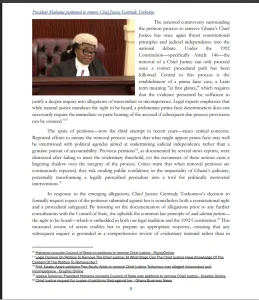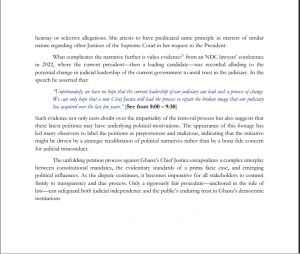IMANI Africa has weighed in on the petitions seeking the removal of Chief Justice Gertrude Torkornoo, noting that a 2022 statement by former President John Dramani Mahama has added complexity to the matter. The comment, made at an NDC lawyers’ conference when Mahama was the party’s presidential candidate, suggested that a change in judicial leadership was necessary to restore public trust.
At the event, Mahama remarked, “Unfortunately, we have no hope that the current leadership of our judiciary can lead such a process of change. We can only hope that a new Chief Justice will lead the process to repair the broken image that our judiciary has acquired over the last few years.”
IMANI’s Criticality Analysis of Governance Issues (March 23–29, 2025) highlights that this statement raises concerns about the impartiality of the removal process and suggests possible political motivations behind the petitions. The think tank noted that the emergence of this footage has led some observers to view the petitions as politically driven rather than based on legitimate concerns of judicial misconduct.
The organization further analyzed the constitutional and legal dimensions of the petition, emphasizing that under Article 146 of the 1992 Constitution, a Chief Justice can only be removed following due process and the establishment of a prima facie case. Legal experts stress that while fairness demands that the accused be given the right to be heard, the preliminary determination of a prima facie case does not always necessitate an immediate hearing.


IMANI also pointed out that this is the third attempt in recent years to initiate the removal of a Chief Justice, raising questions about whether these petitions serve political interests rather than genuine judicial accountability. Previous petitions were dismissed for lacking sufficient evidence, and repeated attempts risk undermining public confidence in the judiciary.
In response, Chief Justice Gertrude Torkornoo has formally requested copies of the petitions against her, asserting her right to be informed of the allegations before any further steps are taken. This move aligns with the legal principle of audi alteram partem—the right to be heard—and upholds procedural fairness.
IMANI recommends that transparency in the constitutional process be strengthened by ensuring that all petitions and evidentiary materials are made available to the accused. They also propose statutory reforms to establish clearer guidelines for determining a prima facie case in Chief Justice removal proceedings, including public hearings and the submission of detailed written responses.
Ultimately, IMANI underscores the need for due process and transparency to prevent politically motivated actions from eroding judicial independence and public trust in Ghana’s democracy.

